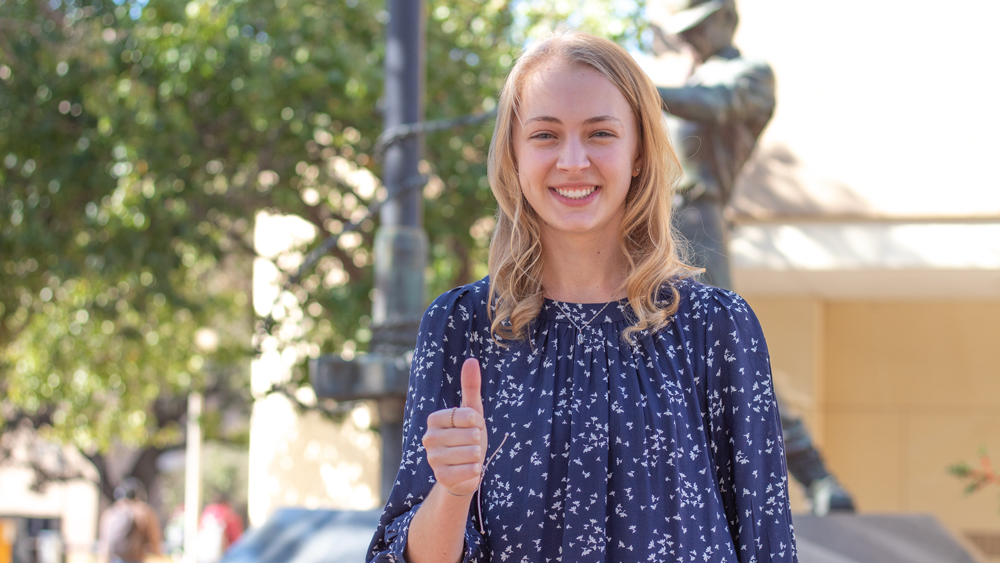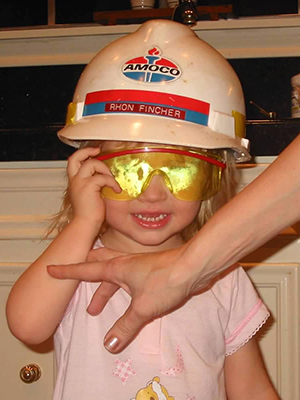
“It's amazing how many parallels there are between golf and life. I never worry about all the years I spent practicing golf going to waste because they taught me to work hard. I'm comfortable under pressure now, applying that ‘take life one shot at a time’ mentality,” said Anna Claire Fincher.
Fincher, a junior Texas A&M University engineering student, is a two-time high school state champion in golf, but she chose not to pursue college-level golf. Instead, she applies her hard-won athletic skills to her high-pressure major: petroleum engineering.
To be fair, Fincher picked up a hard hat long before she swung a golf club.

Fincher’s father is a petroleum engineer, and she remembers listening in on her dad’s morning operations calls when she was little. The interesting and exciting words he used made her wonder what he did in his job. When she participated in a second-grade career presentation, where she and her classmates stated what they wanted to be when they grew up, Fincher made her intentions known.
“Everyone else wanted to be a cowboy or vet,” said Fincher. “I said, ‘oil engineer,’ because I didn’t know the word petroleum.”
Her father was also responsible for Fincher’s love of golf. He encouraged her to pick up her first golf club when she was ten, and she started playing tournaments soon after that.
By the time she entered high school, Fincher had an impressive two handicap that put her in the top 5% of golf players. Plus, she had visited many well sites with her father. Her dad and golf coach both taught her the value of self-discipline and handling stress in the moment. The leaders, roughnecks and other personnel she spoke with at the wells taught her to appreciate petroleum engineering from its roots.
A natural with math and science, Fincher stuck with her second-grade decision to become an engineer rather than play collegiate golf. She confirmed her decision to apply to petroleum engineering after speaking with Cathy Sliva, the undergraduate program director of the Harold Vance Department of Petroleum Engineering at Texas A&M.
Fincher is currently traveling the academic road she always dreamed of, though there have been some challenges and pleasant surprises she never saw coming.
“I was a super introvert who probably said one word my entire freshman year in high school,” said Fincher. “This is a very social major needing skills like networking, so getting myself out there has been a personal challenge. And I didn’t expect opportunities like the Petroleum Ventures Program. I thought business majors and petroleum engineers were separate. It's great that we can take classes at the Mays Business School. I know that will really help my career.”
Her strong faith and deep family ties give Fincher encouragement and guidance as she navigates college. A large community of engineering students attends the same church she does, and she said they all support each other. She also credits the small size of the petroleum department with getting academic answers quickly when she needs them.
Fincher is naturally curious about how things work, so she likes her classes even if she’s still waiting for chances to practically apply in industry what she’s being taught at Texas A&M. She feels that, just like her golf lessons, nothing learned is ever wasted, and she looks forward to using her hard-won knowledge in her future career.
Academically, her golf skills of concentrating on the moment and backing all her efforts with diligence are paying off. Fincher recently competed in the Joe B. Foster ’56 Student Paper Contest this spring, where students do research on petroleum-related issues and offer their results or proposed solutions in presentations before industry judges. She took second place in the junior division. Fincher also applied those skills to her internship with Occidental Petroleum Corporation last summer. They were very impressed and invited her back this coming summer.
Still, this junior takes everything in stride as she faces whatever comes next.
“I’ve learned to play golf well, but I don’t like bragging,” Fincher said. “You don't cheer during play. You focus on working hard in the moment. It's always at the end when people find out what you can do.”